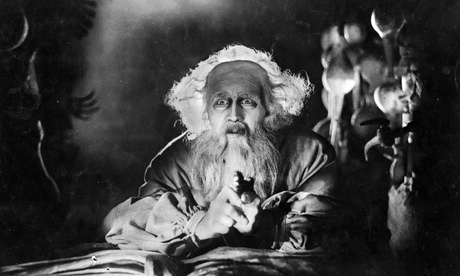
This was the great FW Murnau's final German movie before crossing the Atlantic to make a triumphant US debut with Sunrise (1927). Subsequently he completed three more movies before his death in a motor accident at the age of 42. Faust was conceived by UFA Studio as a grand prestige production to show the international film world what it was capable of. Subtitled "A German Folk Tale" and drawing on a variety of sources including Marlowe, Goethe and Gounod, it is a magnificent symphony of light and darkness in which the demon Mephisto (Emil Jannings) wagers with an archangel for the soul of the elderly medieval scholar Faust (the Swedish matinee idol Gösta Ekman).
Faust is first lured by the chance to save his fellow citizens from plague. Then he's offered the restoration of his youth to enjoy the pleasures of the flesh, including the pursuit and abandonment of Marguerite/Gretchen, played by the German newcomer Camilla Horn (a role originally offered to Lillian Gish). The stylised, expressionist sets are designed by the team that created The Cabinet of Dr Caligari; every shot is exquisitely composed; the German titles in beautifully cut Gothic script are by the Nobel prize-winning writer Gerhart Hauptmann. The fantastic scenes, including an aerial flight across Europe (inspired, it's said, by Murnau's first world war experience as a pilot in the imperial air force), are still magical, and the film is dominated by Jannings's charismatic Mephisto, made up like a character in the kabuki theatre.
The movie evokes a vast range of western art from Rembrandt to Caspar David Friedrich, and its subsequent influence reaches from Disney's Fantasia to Jean-Luc Godard, all of which is discussed in an excellent commentary by Bill Krohn and David Ehrenstein. The film was, at the time, neither a major popular nor critical success, many patronising reviewers thinking it lacked the philosophical depth of Goethe and the tragic resonance of Marlowe. Some of the disappointment may have come from the poorly edited version shown abroad. This three-disc box contains a meticulously restored Blu-ray disc of the German original, as well as the inferior export, and has alternative orchestral and harp scores.

